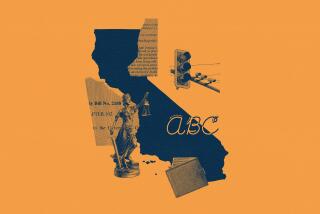Curfew Unfair to Parents, Youth
- Share via
Most people automatically say “yes” to juvenile curfews because they think kids shouldn’t be out at 2 in the morning.
I, for one, do not believe a 10-year-old should be out past 9 p.m. But that’s my opinion. You may think 8 p.m. is more appropriate. Another may think 10.
As a single parent of a 15-year-old, I am responsible for knowing where my child is at every moment and ensuring that he abides by the law. Camarillo has already scrapped its daytime curfew with a “wait and see” approach, pending the results of lawsuits in other cities. The City Council should also consider current lawsuits and rulings on night curfews. Let’s put emotions aside for a moment and consider logic.
Curfew laws have been around for a long time. The original Camarillo law has been deemed unconstitutional, so the city has rewritten it to make us believe that it now protects our rights. The new and improved version prohibits minors under 18 from being out in public from 10 p.m. to 6 a.m. Sunday through Thursday, and midnight to 6 a.m. Friday and Saturday. The exceptions: if the child is with a parent, engaged in an errand, in a car while traveling, at a job or going to and from that job; emergency; sidewalk in front of the child’s residence; if the child is involved in school/religious activity or activity with adult supervision (can come and go without detour or stop); and if the child is legally independent.
These exceptions are loose. Not only that, but the law simply cannot be enforced consistently and there are too many ways around it. It cannot be enforced without punishing innocents and providing criminals with legal fodder.
Suppose the weekend midnight curfew is enforced. This means that my son cannot visit an unsupervised friend’s house, eat pizza, watch a movie and ride his bike home after 12. When he turns 16, he cannot go to a movie that ends after 12, go get a burger with his friends and drive himself home. Nor can he stand in front of the theater and talk about the movie with any of his friends.
I, or another adult, would be required to be physically present every time he is out past midnight. Otherwise, I would be breaking the law and my son could be ticketed, resulting in a fine that I would have to pay. If it happened again, we would both get police records. If the first ticket were issued with my knowledge and concurrence of him being out, I would be guilty of a misdemeanor from the get-go.
This happens regardless of the fact that my son is a good student who is active in school sports, and regardless of the fact that I am a law-abiding parent who talks to her son’s school counselor frequently to follow his progress.
On weekdays, at 9:59 p.m. my son is an upstanding student. At 10:01 he is a criminal by virtue of being in public. Sound ludicrous? It’s the law.
The manner in which the city wants to enforce the law will not stop the unlawful kids out there who are really committing crimes. They are the first ones who will find the loopholes and use them. I can see it now: My son will answer honestly to the police with “I’m going home, I just had pizza and watched a movie,” and he will be presented with a ticket and a fine. Incorrigibles will say “We are having a prayer session,” or “This is a political rally.” No ticket, no fine, no accountability.
*
And what will the city do when the university comes to town? Ticket 17-year-old students standing around discussing a lecture?
If I wish to stand against a lamp post in your neighborhood throughout the night, it is not a crime. If a minor does, it is. If the minor is screaming at the top of his lungs, that is a crime known as disturbing the peace. If the minor walks onto your property, it is trespassing, a crime.
Many people forget their younger years and look at a group of teens as trouble. One of the most important parts of adolescent development is socializing. “Hanging out” together is not a crime. Defining being out past certain hours as a crime is unreasonable.
Innocent until proven guilty, remember? I think that’s actually written somewhere.
If kids want to commit a crime, they are going to do it, curfew or no curfew. Also, per the Department of Justice, violent juvenile crimes peak at the end of the school day--not at night, nor during the previously proposed daytime curfew hours--and decline through evening hours.
Parents take note: Busy kids don’t have time to get into trouble.
So other than parental rights and constitutional issues, for what other reason shouldn’t we have a curfew? Will, or can, the city allocate the additional funds for enforcement? Does anyone in Camarillo consider busting underage kids at a fast-food restaurant a wise use of public funds?
The city should certainly reconsider whether this law is worth the harassment of lawful students and parents and the financial downfall that is likely to occur. As courts all over the country are proving, curfew laws are a lose-lose situation.
More to Read
Sign up for Essential California
The most important California stories and recommendations in your inbox every morning.
You may occasionally receive promotional content from the Los Angeles Times.










